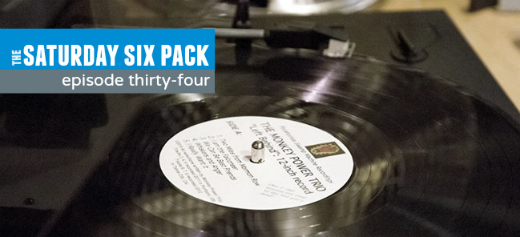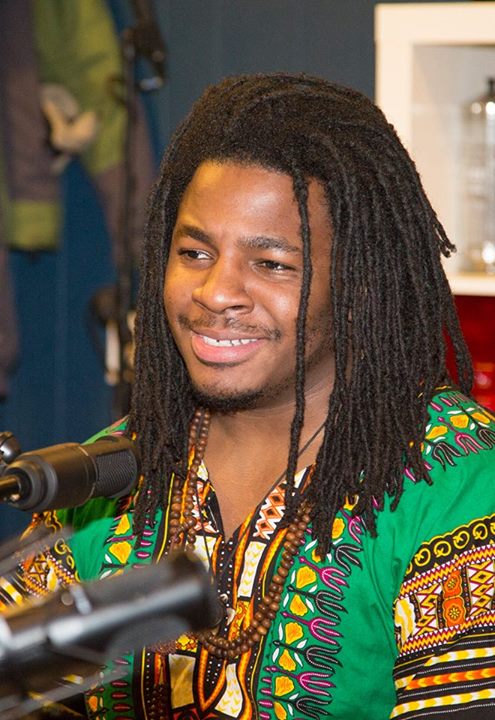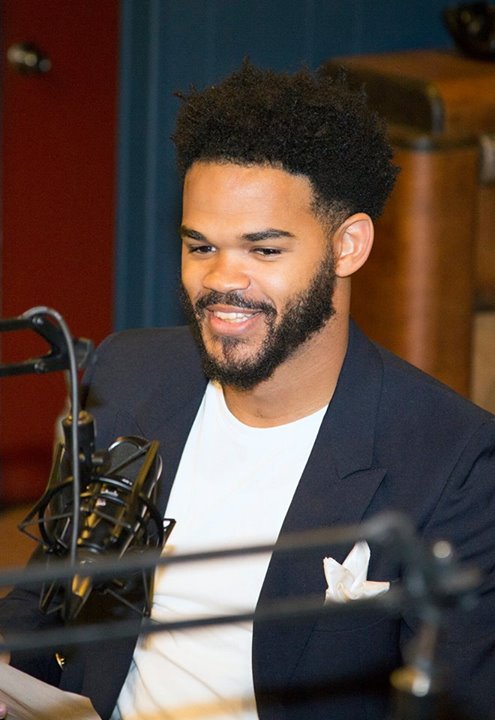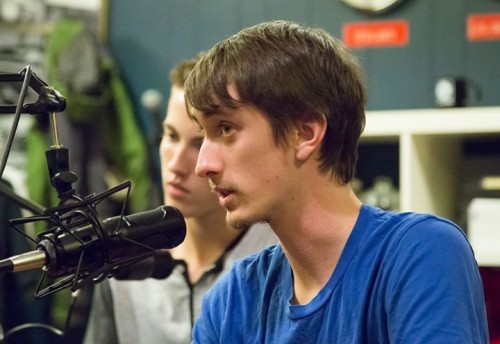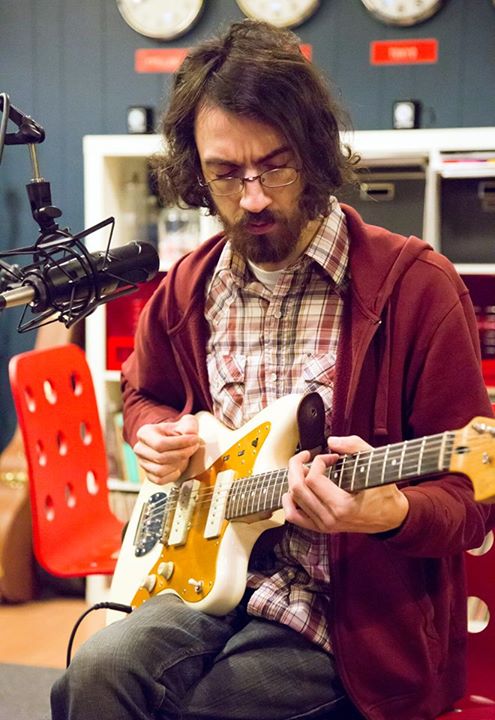If you haven’t yet listened to last weekend’t episode of the Saturday Six Pack, you should. It was a nearly perfect mix, at least from my perspective, of seriously thought-provoking and just plain fun. Among other things, we talked with a representative from the University of Michigan delegation at the Paris climate talks, two of the student leaders behind The Black Student 10-Point Plan at Eastern Michigan University, and a seriously passionate local historian on a mission to correct misconceptions about what life was really like for the women working the line at Ypsilanti’s Willow Run bomber plant during World War II. It was seriously good from beginning to end… even the part late in the show where Jim Cherewick and I just played songs off the new Monkey Power Trio record as young men on drugs repeatedly attempted to get into the studio… Here are just a few of the highlights.
We began the show by talking with Eastern Michigan University students Darius Simpson and Daryl Holman about The Black Student 10-Point Plan that has been proposed for Eastern. After taking some time to get acquainted, we went though the plan point by point, discussing why, in the opinion of those who drafted the document, each is important… Here, for those of you who haven’t yet seen the complete list, are the ten demands.
1. We demand that the amount of black faculty should match the amount of black students. Excluding all faculty in the Africology department. Meaning the ratio needs to match without including the black faculty in that department.
2. We demand all students should take a general education race, ethnicity, and racism course.
3. We demand Black studies built into the curriculum of every major.
4. We demand Annual cultural competency for all faculty and staff including DPS.
5. We demand a CMA that has the capacity to host large groups of marginalized students in a safe space without restrictions on outside food. We demand a functioning CMA allowed proper space and given proper recognition.
6. We demand low-income meal plan option/not requiring that students who live on campus to acquire a meal plan.
7. We demand several black financial advisors whose sole purpose is to find and distribute scholarships and financial aid to and for black students specifically.
8. We demand a separate committee, made up of students selected by Black Student Union, for Black Homecoming Week with the autonomy and power to schedule and hold events for Black Homecoming.
9. We demand a Doctorate and Master’s Program for Africology and African American Studies with adequate funding and no less 3 full-time graduate assistantships.
10. We demand the Women’s Resource Center dedicate at least 3 programs a year to black women specifically. We demand a black resource center under the umbrella of the Center for Multicultural Affairs.
As Simpson and Holman see it, these are all things that EMU administrators should want to do, seeing as how they aggressively market the diversity of Eastern’s student body. And, according to them, their initial meetings with university representatives have been positive. They said, for instance, that EMU Interim President, Provost, and Executive Vice President of Academic and Student Affairs, Kim Schatzel, told them that they’d have her support. Of course, less than 24 hours after telling them that, Schatzel announced that she’d be leaving EMU to take a job at a university in Maryland, but Simpson and Holman are confident that, in spite of the leadership vacuum left by Schatzel’s departure, and EMU’s notoriously uncooperative Board of Regents, that they can make something happen. Simpson [seen below] tells us that he’s confident that the Regents will do the right thing in this instance. “I’m a firm believer in people power,” he said, before telling us how he and his fellow students intend to put the Regents “in a corner” and force them to make a decision. “You don’t get to step away from this,” Simpson said of the Regents, who have skirted responsibility on numerous other issues in the past. “This is something that will follow (them) until (they) make the right decision.”
It’s worth noting that EMU is not the only U.S. college where such things are being discussed. According to the site The Demands, as of today black students on 74 college campuses have made formal demands of their university administrators. While some of these demands have focused on the removal of specific officials, like we just saw at the University of Missouri, and the renaming of certain university buildings, like at Yale, most, according to a recent analysis done by FiveThirtyEight.com, are more broad and structural in nature, like those being proposed by EMU students. “The most common demands, according to our analysis,” says FiveThirtyEight’s Leah Libresco, “have been for schools to increase the diversity of professors, offer sensitivity training to students and faculty members, and create or expand support for cultural centers on campus.”
Saying, “These desires aren’t new,” Holman [seen below] explaining how, even though they’ve just committed these thoughts to writing, these are things that the black student body has been thinking about for a long time.
[If you would like to listen to episode thirty-four of The Saturday Six Pack, you can either download it from iTunes or scroll the bottom of the page, where you’ll find the Soundcloud file embedded.]
Then, at the 37-minute mark, local historian Matt Siegfried came by to dispel a few local myths surrounding the Willow Run bomber plant, and the “Rosie the Riveters” who worked there during World War II. Siegfried, having followed the local reporting around this past October’s celebration of our local “Rosies,” in which 2,097 people dressed up in blue overalls and tied their hair up in red kerchiefs, felt as though people should know the real history was significantly more complicated than the commonly accepted narrative would have us believe. Everyone didn’t come together happily in America’s so-called “arsenal of democracy” to roll up their sleeves, pitch in, and help win the war effort, he argued. According to Siegfried, the situation was far from ideal for the women who worked at the plant, who lived in shacks without running water, often employed wildcat strikes to shut the plant down, and actually hated being forced to wear the those blue overalls we all imagine them working so happily in… “Myths deserve to die,” said Siegfried.
For an “arsenal of democracy,” Siegfried said, it wasn’t very democratic. Detroit was under martial law during World War II, he said, and Fourth of July celebrations between 1943 and 1945 were cancelled in Ypsilanti due to fear of potential race riots. “It was a tenderbox of race, gender and class conflict,” Siegfried said, as people competed for jobs and housing in a community essentially run by Henry Ford, who had made a conscious decision to import poor white workers from Kentucky, who he thought would be more anti-union, rather than hire the people here in southeast Michigan who needed jobs… It was a fascinating conversation, and I’d recommend that you listen to it. [I had no idea that the UAW actively pushed to integrate the Willow Run plant against the wishes of Ford.]
[Siegfried, laving listened to much of my interview with Simpson and Holman, started the segment talking about the historical precedents for the black student protests we’re seeing today at EMU. The Student Liberation Action Movement, he said, brought the National Guard to Ypsi in 1970, where, over three nights, over 100 people were arrested. That campaign, according to Siegfried, was led by black EMU students who wanted things very much in line with what today’s students behind The Black Student 10 Point Plan want.]
And, at the 53-minute mark, we were joined in the studio by 350.org’s Ethan Wampler and University of Michigan undergrad Jim Stehlin, organizers of the December 12 Michigan Climate March. During our discussion about the local response to global climate change, we were also be joined on the phone by U-M professor Dr. Ricky Rood, who talked with us, among other things, about current research into how we address the problems associated with climate change, and how realistic the current goal as stopping climate change at a 2-degree celsius increase over pre-industrial levels really are. [Rood seems to think that, given the reality of the situation, it’s unlikely that we’d be able to stop the temperature increase at 2-degrees. He did say, however, that he believe humanity would adapt, and that mankind would find a way to adapt, even at a 4-degree increase. Life wouldn’t be like we know it now, though, he said.]
And, during our live conversation with Wampler, Rood and Stehlin, we also dropped in several prerecorded exchanges between myself and Dr. Paul Edwards, the author of A Vast Machine: Computer Models, Climate Data, and the Politics of Global Warming
If you care about the climate, or, for that matter, the future of life on earth, consider joining hundreds of others in Ann Arbor this Saturday, December 12th, for the Michigan Climate March, where we’ll be marching for a just transition to 100% renewable energy by 2050 in Michigan… Here are Stehlin and Wampler telling us what to expect.
And, at 1:47, local musicologist Jim Cherewick came in to listen to the new Monkey Power Trio record with me, and discuss the “face eating” class of drugs popular with kids today. The highlight for me was when Jim covered the Monkey Power song Portland is Doomed, but a lot of good stuff happened… Two members of the Monkey Power Trio even called in. One was promptly hung up on. The other talked at length about how the whole idea behind the band, which seemed brilliant to us at 25, is actually starting to bum us out a little bit, now that we’re all approaching 50. [The idea was that we’d meet one day a year and record an album until every last member of the band is dead. Now that we’re beginning to confront our mortality, though, it’s not quite so interesting of a concept.] Here’s Jim, who went on the record describing Monkey Power’s music as “warm and inviting.”
Thanks, as always, to AM 1700 for hosting the show, Kate de Fuccio for documenting everything with her camera, and Brian Robb for running the board, making sure the bills paid, and insuring that the toilet paper and bleach stays stocked. [All photos above come courtesy of Kate.]
If you like this episode, check out our archive of past shows at iTunes. And do please leave a review if you have the time, OK? It’s nice to know that people are listening, and, unless you call in, that’s pretty much the only way we know.
Now, if you haven’t already, please listen for yourself, and experience the magic firsthand… Oh, and tell you friends.
